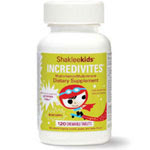Have these steps to reduce Body Burden been helpful? I hope so. I know that no one can do it all... at least right away... but even making a few changes is ever-so-beneficial. If you haven't made any changes yet, today's the day! Review the previous six steps and choose at least one to implement in your family life.
Without further ado, here is Step Seven:
Try to get the plastic containers out of your kitchen and replace them with glass containers.
What's so bad about plastic? Did you know that plastic continuously gasses off toxic fumes? Not good. These chemical fumes have been shown to disrupt the endocrine system and increase risk of cancer. We can't stop the world's plastic dependency, but we can reduce the amount of plastic that we use in our kitchens (and the amount of plastic our children play with -- see Melissa and Doug's options). When we store food in plastic, the toxic fumes from our containers, plastic bags or plastic wrap soak into the food we will later ingest. Yes, these are small amounts. But, they do add up. And, over time, they become part of our total Body Burden, which can have a huge effect on our health.
What can you do? You can start by using old baby food jars, peanut butter jars and spaghetti sauce jars for keeping leftovers. You can also purchase a glass storage container set for food that doesn't easily store in jars. I found a pyrex storage set at a kitchenware outlet for an amazing deal. I have been very pleased with it. If you take a lunch to work or send a lunch with your kids to school, consider purchasing stainless steel containers for food and for water.
Bottom line. If you can't do an overhaul and replace all your plastic containers, you can at least stop heating food in plastic containers. This is a must. When plastic is heated, the chemicals leach out at a greater rate. Use pyrex or corningware for heating instead.
There is so much more to say about plastic. I encourage you to take five minutes to learn more. Read this exceptional quick-reference at LifeWithoutPlastic to learn what types of plastic to stay away from and to see more tips for living plastic-free in the kitchen.
Subscribe to:
Post Comments (Atom)









































4 comments:
Wow, that is new to me!! Does this apply to water bottles too??
Hi Martha! How are you doing? Yes, this does apply to water bottles. Best to check the number on the bottom of the bottle... the one in the little triangle. Then check the list at www.LifeWithoutPlastic.com/factsonplastic.htm This list will tell you what risks are associated with each type of plastic.
:) ae
ae-one warning about steel, we got some of the sigg water bottles, and have been less than thrilled. they dent when dropped (which happens OFTEN) and according to the manufacturer, you are supposed to discard them when dented. also, they aren't dishwasher safe. kind of a downer.
what are your thoughts on the plastics that don't have bpa?
This something that hubby and I have been talking about lately. We've been on the lookout of glass jars and basically try to use the old glass jars instead of the plastic ones. It's a journey but we're taking it one step at a time.
Post a Comment